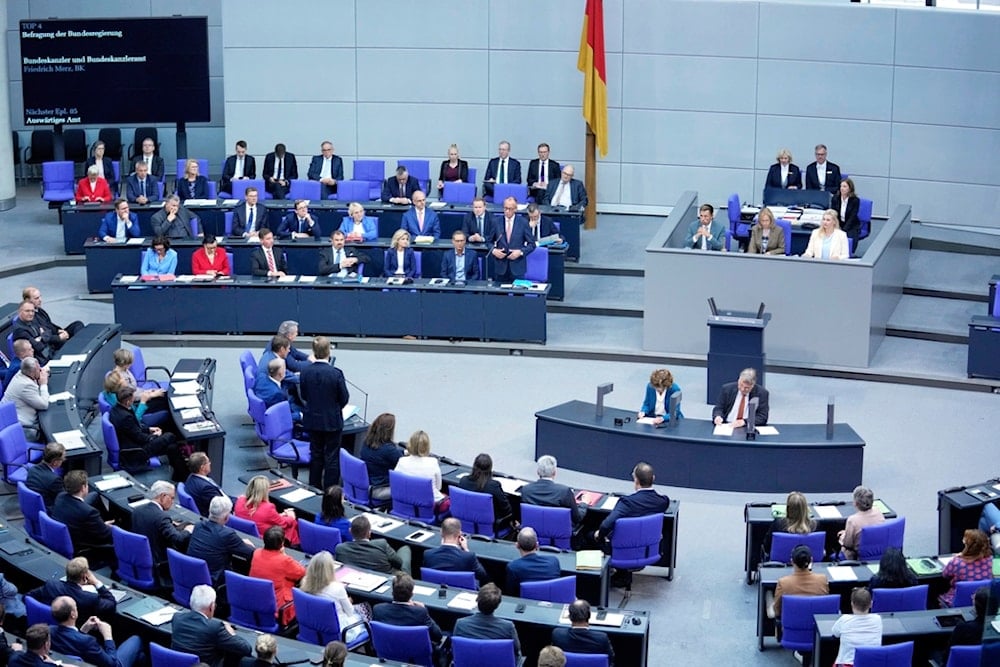Merz arms export halt to 'Israel' sparks rift in German coalition
Merz had in recent weeks faced mounting criticism for his reluctance to join a statement by dozens of Western countries condemning the "inhumane killing" of Palestinians.
-

German Chancellor Friedrich Merz speaks during a debate about the budget 2025 at the German parliament Bundestag in Berlin, Germany, Wednesday, July 9, 2025 (AP Photo/Ebrahim Noroozi)
Germany's governing coalition is under strain after Chancellor Friedrich Merz announced the suspension of military export permits to "Israel" for equipment that could be used in the Gaza Strip, Bild reported Friday.
The Christian Social Union (CSU), the Bavarian sister party of Merz's Christian Democratic Union (CDU), was not consulted beforehand and only learned of the decision after it was made. The omission has fueled friction, particularly as the CSU maintains close ties with "Israel." Senior CSU figures, including Bavarian Prime Minister Markus Söder and Interior Minister Alexander Dobrindt, have long cooperated closely with the Israeli regime. In July, Dobrindt met Prime Minister Benjamin Netanyahu and pledged Germany's full support.
Bild sources say Merz, under pressure from the Social Democrats and amid rapid developments in Gaza, acted decisively. Although Berlin had already halted direct arms deliveries to "Israel" since the war began, it was still supplying components such as tank engine parts.
Merz had in recent weeks faced mounting criticism for his reluctance to join a statement by dozens of Western countries condemning the "inhumane killing" of Palestinians, drawing ire from coalition partners in the SPD who believe Germany should have signed the joint declaration. Critics, however, argue that this late decision does not absolve him of earlier inaction, nor does it erase Germany’s failure to take a principled stance during key moments of the Gaza crisis.
Gaza occupation
The announcement came as Netanyahu declared plans to seize control of the entire Gaza Strip, remove roughly one million Palestinians from Gaza City, and transfer authority to a new "civilian administration" excluding both Hamas and the Palestinian Authority. The operation includes forced evacuation by October 7, a siege on remaining fighters, and a ground assault.
Netanyahu said it would dismantle Hamas, secure the return of captives, and place Gaza under Israeli "security control" to prevent future attacks, while promising a temporary occupation and humanitarian aid outside combat zones.
Critics argue these assurances are hollow given "Israel's" record of indefinite military presence in occupied territories and its ongoing blockade of Gaza.
Global Outrage
The plan has drawn sharp international criticism. UK Prime Minister Keir Starmer urged "Israel" to reverse the takeover, calling it "wrong" and counterproductive. UN High Commissioner for Human Rights Volker Türk demanded its suspension, warning it undermines the Palestinian right to self-determination. Turkey's senior presidential adviser Burhanettin Duran denounced the offensive as "outright genocide" and urged global action.
Read more: US Envoy Huckabee slams UK over PM Starmer's Gaza takeover criticism
Palestinian Ambassador to the United Nations Riyad Mansour called it a blatant violation of international law and a rejection of global consensus. "This escalation by the Israeli government is in total contradiction with the will of the international community, international law, and common sense, and, I even dare to say, against the wish of the majority of the people inside Israel," Mansour told reporters at UN headquarters on Friday. "We need all of us collectively to prevail, to stop this insanity and to allow peace to be the option of war and the continuation of the suffering."
Hamas has also rejected the move, calling it a sign that negotiations have been abandoned in favor of cementing permanent Israeli military control.
Humanitarian agencies warn that mass displacement and a siege will deepen Gaza's crisis, where severe shortages of food, water, and medical supplies have already pushed the enclave toward famine and systemic collapse.

 4 Min Read
4 Min Read








